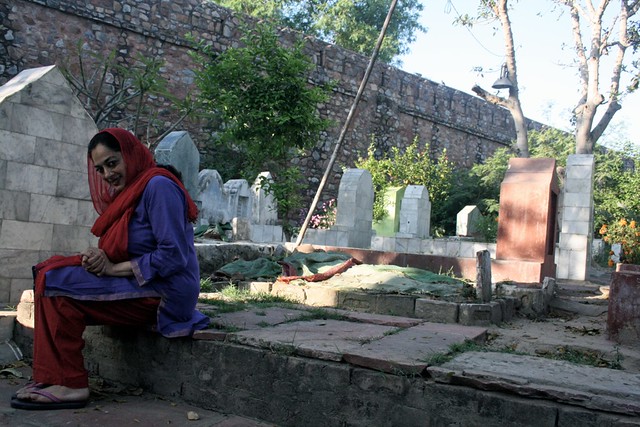
Mission Delhi – Sadia Dehlvi, Hazrat Nizamuddin Chilla

One of the one per cent in 13 million.
[Text and pictures by Mayank Austen Soofi]
“I want to be buried here,” says Sadia Dehlvi, the author of Sufism: The Heart of Islam. The Delhi Walla meets her at Nizamuddin Chilla, the serene retreat of Hazrat Nizamuddin Auliya, just behind Humayun’s Tomb. It is early morning. Here, the city’s iconic 14th century Sufi saint lived, meditated, and died. Ms Dehlvi walked over from her home in nearby Nizamuddin East, one of Delhi’s most elegant residential districts.
Standing amid the shrine’s little graveyard, Ms Dehlvi says, “It is with the mitti (earth) of Delhi that I wish my remains to mingle with.” Her family has lived in the city for centuries. The name Dehlvi literally means “someone from Delhi”. Till a few years ago she lived in a mansion on Sardar Patel Marg. Hers was one of the first Muslim families to have a large establishment in New Delhi. Ms Dehlvi’s father and grandfather were publishers of the influential film and literary Urdu journal Shama. “Throughout my childhood I saw actors, writers and poets coming in and out of the house, and my grandfather loved hosting receptions for them.” In the evening, the house at SP Marg regularly hosted cultural soirées. It became an institution and was known as Shama Kothi. In the 1990s, the magazine had to close because of a dwindling Urdu readership.
A few years later, a family crisis forced the Dehlvis to sell the house. The buyer happened to be Mayawati, the leader of the Bahujan Samaj Party. Shama Kothi became BSP House. Ms Dehlvi moved to Nizamuddin East. “This transfer of property is reflective of the changes taking place in the city’s social and political character,” she says.
Shama Kothi had 40 rooms, 15 members of an extended family and 25 retainers. At the apartment in Nizamuddin East, where Ms Dehlvi’s son lives with her, she has four rooms and two servants. “For me, this move was a hijra, a symbolic migration where one encounters physical and emotional displacement that brings suffering. The pain purifies the soul, triggering an inner change that connects you with the truth, with God. And truth is…” Ms Dehlvi walks ahead, looking at the tombs and reading the inscriptions. Some tombs have potted plants. One has marigold flowers growing out of it. Another is covered with grass.
Ms Dehlvi’s musician son Arman was born in Karachi, where she lived briefly with his Pakistani father. Today mother and son invite friends almost every evening to their second-floor flat, whose roof faces Humayun’s Tomb. While Arman sings Sufi songs or plays the tabla, Ms Dehlvi talks politics, discusses new books, plays qawwalis on YouTube, and shares stories about Delhi. She laughs easily. The evenings end with a dinner cooked by Ms Dehlvi herself. Although aloo salan remains the favourite with friends, sometimes they are surprised with the unexpected—such as baked fish, Italian style.
After her family house was sold, Ms Dehlvi found herself unable to write, even though she had been a columnist for newspapers for decades. “The collapse of our legacy was soul-crushing.” Two years later, Ms Dehlvi began work on her book on Sufism. In 2009, it was released by her mentor, author Khushwant Singh. “Researching the lives of the Sufis and reading Islamic philosophy helped me understand that pain is a gift from God. I started seeing myself as being blessed and not cursed. ”
Walking between a jumble of tombstones, she stops suddenly and says: “Another reason why I want to be buried here is because it is close to my home. Hopefully, my son would find it easier to visit me more often.” She adds with a laugh, “Also, it’s more important to have a good neighbour in death than in life.” Just then Ms Dehlvi’s BlackBerry rings. “Oh, I must head back. There’s the India-South Africa cricket match today.”
[This is the 40th portrait of Mission Delhi project]
1.
2.
3.
4.





[…] here for Sadia Dehlvi, the 40th portrait. Share and […]
Shabaash Mayank, you always come through, as always.
Sadia Dehlvi is a Delhi icon – I celebrity-spotted my favourite Dilliwali at the Sufi Musical Night @ Arab Ki Sarai a few weeks ago, and she looked absolutely radiant – may she always be the light of Delhi. Alas, I’ve never had the privilege of meeting her, but if I do, I’d confess to her that we do have something in common – we share a mutual penchant for EG tea!.
Wonderful post. May Allah bless Sadia Dehlvi. I share her view that it is through pain and suffering that we truly appreciate our Creator, our place in this temporary world. Suffering is a gift from Allah, for there is always hope and chance of renewal after suffering and pain.